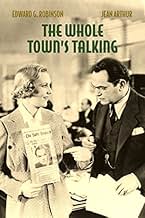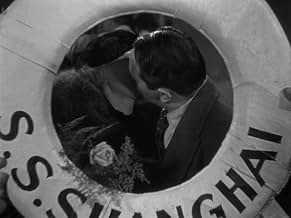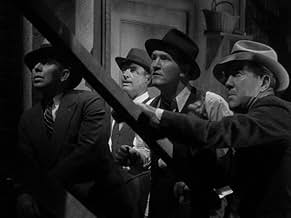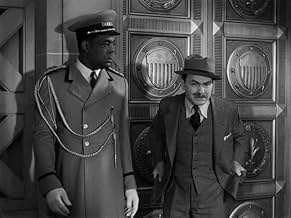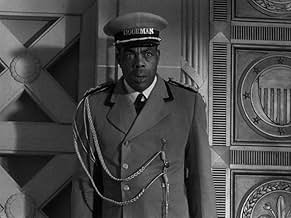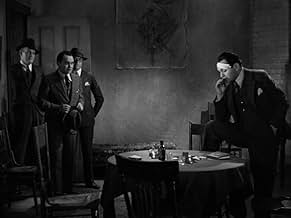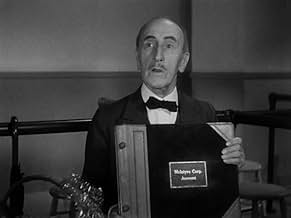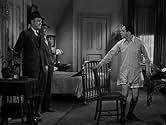PUNTUACIÓN EN IMDb
7,3/10
3,6 mil
TU PUNTUACIÓN
Un tranquilo contable es confundido con el enemigo público número 1, por lo que el asesino real se aprovecha de la situación.Un tranquilo contable es confundido con el enemigo público número 1, por lo que el asesino real se aprovecha de la situación.Un tranquilo contable es confundido con el enemigo público número 1, por lo que el asesino real se aprovecha de la situación.
- Dirección
- Guión
- Reparto principal
Harry Abrahams
- Convict
- (sin acreditar)
Ernie Adams
- Reporter
- (sin acreditar)
Carmen Andre
- Clerk
- (sin acreditar)
Chester A. Bachman
- Policeman
- (sin acreditar)
Eddie Baker
- Policeman
- (sin acreditar)
Lucille Ball
- Bank Employee
- (sin acreditar)
H. Barnum
- Undetermined Secondary Role
- (sin acreditar)
George Barton
- Policeman
- (sin acreditar)
Reseñas destacadas
Enjoyed this 1935 Classic in which Edward G. Robinson plays a duel role as Arthur Ferguson, (Jonesy) and Killer Mannion. Arthur Ferguson is an ordinary law abiding citizen and is rather a very meek person. Unfortunately, Ferguson looks just like a gangster named Killer Mannion who is a harden criminal and they both seem to have the same facial appearance. Jean Arthur, (Wilhelmina Clark) gives a great supporting role along with a great cast of veteran actors. There is a split screen between Arthur Ferguson and Killer Mannion and Edward G. Robinson gives an outstanding performance in 1935 which was not seen very often in films during those days. Killer Mannion tries to murder Ferguson in a bank hold up but things get out of hand. There is plenty of drama and comedy. This is truly a great Classic Film. Enjoy
10Norm-30
Edward G. Robinson has been stereotyped to the nth degree as
THE "gangster" (even in Bugs Bunny cartoons!), so it's quite a surprise to see him in the role of a mild, meek clerk (who just happens to be a dead ringer for a gangster!).
The split-screen scenes (where he plays both parts) are excellent & "seamless", and the comedy is heightened by the utterly ridiculous lengths the police go to to catch the gangster!
In one scene, he (as the clerk) is eating lunch in a restaurant, is "spotted" as being the gangster, and within a matter of MINUTES the restaurant is surrounded by HUNDREDS of policeman, riot squads, & machine guns -- all to get the (wrong!) person!
A refreshing comedy; you've got to see this film, if only for Robinson's acting!
THE "gangster" (even in Bugs Bunny cartoons!), so it's quite a surprise to see him in the role of a mild, meek clerk (who just happens to be a dead ringer for a gangster!).
The split-screen scenes (where he plays both parts) are excellent & "seamless", and the comedy is heightened by the utterly ridiculous lengths the police go to to catch the gangster!
In one scene, he (as the clerk) is eating lunch in a restaurant, is "spotted" as being the gangster, and within a matter of MINUTES the restaurant is surrounded by HUNDREDS of policeman, riot squads, & machine guns -- all to get the (wrong!) person!
A refreshing comedy; you've got to see this film, if only for Robinson's acting!
Whole Town's Talking, The (1935)
*** (out of 4)
A timid, shy and all around weak store clerk (Edward G. Robinson) gets mistaken for a harden gangster (Robinson) but his new fame allows him to store writing a column in a newspaper about how gangster are weak without their guns. Soon the gangster shows up wanting more than just a little help. As a comedy this movie is a real masterpiece but as a drama, the final thirty-minutes or so really bring down a lot of the great moments. While watching this Columbia movie you can't help but wonder if this was originally meant to be directed by Frank Capra as it has his screenwriters and the small town story certainly seems like something you'd get from a Capra and not someone like Ford. To his credit, Ford does a great job with the comedy and really delivers one of the funniest movies of the 1930's. The problem happens in the third act when it really turns to too much of a gangster film and the laughs are pretty much forgotten. What holds both sides together is the terrific performance by Robinson. The way he plays the timid clerk is just downright hilarious and this includes a masterfully acted interrogation sequence where Robinson is nearly brought to tears because he's so scared. Seeing a tough guy like Robinson acting scared was just hilarious and one actually starts to feel sorry for the guy because it appears he's about to die. Robinson is also great in his second role as the gangster as he's as tough as ever and does manage to come off quite demanding and threatening. Jean Arthur is wonderful as well and adds many great comic scenes including her own interrogation where she keeps admitting to crimes that she has nothing to do with or even knows about. Arthur Hohl, Arthur Byron, Wallace Ford and Donald Meek round out the supporting cast. You can even see Joe Sawyer playing one of Robinson's goons. Again, I didn't care for the final act of the film as the comedy starts to not happen but that doesn't take away from everything at the start of the movie. Robinson has never gotten the credit he deserves as an actual actor, which is a real shame but this film allows for both sides of him to be highlighted and to great effect.
*** (out of 4)
A timid, shy and all around weak store clerk (Edward G. Robinson) gets mistaken for a harden gangster (Robinson) but his new fame allows him to store writing a column in a newspaper about how gangster are weak without their guns. Soon the gangster shows up wanting more than just a little help. As a comedy this movie is a real masterpiece but as a drama, the final thirty-minutes or so really bring down a lot of the great moments. While watching this Columbia movie you can't help but wonder if this was originally meant to be directed by Frank Capra as it has his screenwriters and the small town story certainly seems like something you'd get from a Capra and not someone like Ford. To his credit, Ford does a great job with the comedy and really delivers one of the funniest movies of the 1930's. The problem happens in the third act when it really turns to too much of a gangster film and the laughs are pretty much forgotten. What holds both sides together is the terrific performance by Robinson. The way he plays the timid clerk is just downright hilarious and this includes a masterfully acted interrogation sequence where Robinson is nearly brought to tears because he's so scared. Seeing a tough guy like Robinson acting scared was just hilarious and one actually starts to feel sorry for the guy because it appears he's about to die. Robinson is also great in his second role as the gangster as he's as tough as ever and does manage to come off quite demanding and threatening. Jean Arthur is wonderful as well and adds many great comic scenes including her own interrogation where she keeps admitting to crimes that she has nothing to do with or even knows about. Arthur Hohl, Arthur Byron, Wallace Ford and Donald Meek round out the supporting cast. You can even see Joe Sawyer playing one of Robinson's goons. Again, I didn't care for the final act of the film as the comedy starts to not happen but that doesn't take away from everything at the start of the movie. Robinson has never gotten the credit he deserves as an actual actor, which is a real shame but this film allows for both sides of him to be highlighted and to great effect.
I saw this movie a long time ago as a teenager during a Edward G. Robinson retrospective. It was the one that stuck in my mind, and I never forgot it. Now I have it on videotape and watch it regularly, it stands multiple viewing very well.
The Whole Town's Talking is one of those perfect little movies. Everything falls into place the acting, the pace, the timing of the jokes, the dialog. Even the set design is fabulous, it was basically the big, bright office space in which the good guy Robinson plays slaves" that was unforgettable to me. The movie boasts an assortment of caricature like characters like no other movie I know, beside Robinson I would like to mention Jean Arthur, of course, and the two funny little guys, Donald Meek and, even more memorable, Etienne Girardot as the pedantic office overseer who urges Robinson to get on with the Macintyre account.
In its social comment The Whole Town's Talking reminds me of the work of Preston Sturgess. Mentionable are the media hype about a famous gangster which is really over the top (it's up there with His Girl Friday in this aspect) and the incompetence of the police force which is unable to deal with the gangster and even less with the media and is presented as a helpless and clueless organization. So the movie still has some actuality.
Movie buffs who look at John Ford as an auteur" may be disappointed. The Whole Town's Talking is very much a product of the studio system. But it amply shows what great things that system was able to accomplish at times!
The Whole Town's Talking is one of those perfect little movies. Everything falls into place the acting, the pace, the timing of the jokes, the dialog. Even the set design is fabulous, it was basically the big, bright office space in which the good guy Robinson plays slaves" that was unforgettable to me. The movie boasts an assortment of caricature like characters like no other movie I know, beside Robinson I would like to mention Jean Arthur, of course, and the two funny little guys, Donald Meek and, even more memorable, Etienne Girardot as the pedantic office overseer who urges Robinson to get on with the Macintyre account.
In its social comment The Whole Town's Talking reminds me of the work of Preston Sturgess. Mentionable are the media hype about a famous gangster which is really over the top (it's up there with His Girl Friday in this aspect) and the incompetence of the police force which is unable to deal with the gangster and even less with the media and is presented as a helpless and clueless organization. So the movie still has some actuality.
Movie buffs who look at John Ford as an auteur" may be disappointed. The Whole Town's Talking is very much a product of the studio system. But it amply shows what great things that system was able to accomplish at times!
I don't think there's anyone who's ever seen The Whole Town's Talking and doesn't believe this was a film intended for Frank Capra. The mere fact that the screenplay was co-written by Robert Riskin who won an Oscar together with Capra for It Happened One Night the year before should give ample indication. If Capra had a choice between this and Broadway Bill he chose wrong.
Although this kind of comedy is not usually what is found in John Ford films, Ford does OK by it. I don't think he ever directed again anything that could be remotely classified as screwball comedy.
Edward G. Robinson who would make his second and last appearance in a Ford film 34 years later in Cheyenne Autumn, plays a dual role. He plays Killer Mannion in the tradition he established as Little Caesar and also A.L. Jones a meek, mild mannered clerk a type Robinson would play later in Mr. Winkle Goes to War.
Mannion's escaped from prison and there's a manhunt on for him, similar to the kind that was on for John Dillinger a year earlier. The police will simply shoot to kill. Bad luck for a guy that looks like Mannion and worse luck when Mannion finds out about his doppleganger and tries to make use of him.
Robinson is fine in his dual performance, but the film was a milestone for Jean Arthur who plays Robinson's fellow employee and despite his being a milquetoast, she sees something in him. Up to this point Arthur had played a lot of ingénues and loyal wives to leading men. This is her first role in a screwball type comedy that she became known for, in fact what she's remembered for mostly. Of course a year later, Harry Cohn did team her with Frank Capra and they certainly made some cinematic history.
My favorite two supporting parts are Etienne Girardot as Robinson's officious little office manager and Donald Meek another milquetoast who originally mistakenly turns in the clerk as the gangster and stays on the 'case.'
Though he's not in his element John Ford serves a nice piece of entertainment.
Although this kind of comedy is not usually what is found in John Ford films, Ford does OK by it. I don't think he ever directed again anything that could be remotely classified as screwball comedy.
Edward G. Robinson who would make his second and last appearance in a Ford film 34 years later in Cheyenne Autumn, plays a dual role. He plays Killer Mannion in the tradition he established as Little Caesar and also A.L. Jones a meek, mild mannered clerk a type Robinson would play later in Mr. Winkle Goes to War.
Mannion's escaped from prison and there's a manhunt on for him, similar to the kind that was on for John Dillinger a year earlier. The police will simply shoot to kill. Bad luck for a guy that looks like Mannion and worse luck when Mannion finds out about his doppleganger and tries to make use of him.
Robinson is fine in his dual performance, but the film was a milestone for Jean Arthur who plays Robinson's fellow employee and despite his being a milquetoast, she sees something in him. Up to this point Arthur had played a lot of ingénues and loyal wives to leading men. This is her first role in a screwball type comedy that she became known for, in fact what she's remembered for mostly. Of course a year later, Harry Cohn did team her with Frank Capra and they certainly made some cinematic history.
My favorite two supporting parts are Etienne Girardot as Robinson's officious little office manager and Donald Meek another milquetoast who originally mistakenly turns in the clerk as the gangster and stays on the 'case.'
Though he's not in his element John Ford serves a nice piece of entertainment.
¿Sabías que...?
- CuriosidadesThe $250.00 per week that Jones is to get for writing the article in this 1935 comedy translates to $4,999.23 per week in 2019 dollars.
- PifiasWhen Jonesy leaves his apartment in a rush he forgets to turn off the taps and his tub is (torrentially) overflowing. But when he returns from the police much later in the day there is no water anywhere.
- Citas
Arthur Ferguson Jones: You know something, a woman is only a woman, but a good cigar is a smoke.
- ConexionesEdited into This Is It (2009)
Selecciones populares
Inicia sesión para calificar y añadir a tu lista para recibir recomendaciones personalizadas
- How long is The Whole Town's Talking?Con tecnología de Alexa
Detalles
- Fecha de lanzamiento
- País de origen
- Idioma
- Títulos en diferentes países
- The Whole Town's Talking
- Localizaciones del rodaje
- Empresa productora
- Ver más compañías en los créditos en IMDbPro
- Duración
- 1h 33min(93 min)
- Color
- Relación de aspecto
- 1.37 : 1
Contribuir a esta página
Sugerir un cambio o añadir el contenido que falta


